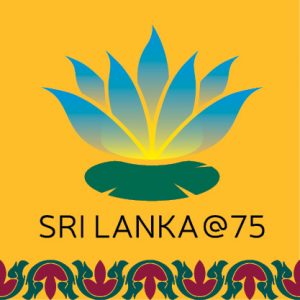 This final post in the series looks ahead from Sri Lanka @ 75, to what may lie in future for her peoples. Farzana Haniffa suggests that the time may finally have come when the country’s electorate may consider new political leadership, away from its tradition of dynastic politics and politically-élite families, as one after-effect of the unique Aragalaya/Porattam/Struggle of the summer of 2022, and usher in a new era of politics.
This final post in the series looks ahead from Sri Lanka @ 75, to what may lie in future for her peoples. Farzana Haniffa suggests that the time may finally have come when the country’s electorate may consider new political leadership, away from its tradition of dynastic politics and politically-élite families, as one after-effect of the unique Aragalaya/Porattam/Struggle of the summer of 2022, and usher in a new era of politics.
As I write this post at the end of November 2023, Israel’s indiscriminate bombing of Gaza for over almost 2 months continues. We watch on social media and television as Western powers showcase their complicity while their citizens throng the streets in protest. In Sri Lanka, many remember the last days of the Civil War (1983–2009) when the Sri Lankan government acted in a similar manner against civilians in the Vanni in pursuit, we were told, of the Liberation Tigers of Tamil Eelam (LTTE) that was using human shields.
*
The Sri Lankan population is exhausted from the consequences of the economic and political crisis that it has now been facing for 2 years. Like several other countries in the Global South, Sri Lanka too is in a balance of payments crisis that has led to it defaulting on its international debts. We are in the midst of an International Monetary Fund (IMF) programme, the conditions of which compel us to prioritise debt-restructuring and a budget surplus for 2025 — which, to the citizen, means austerity. With the cost of living increasing by 100 per cent and the middle classes burdened by a suddenly introduced taxation system, there is a rapid exodus of the educated youth and a mass migration outward of middle-class families. The poor, unable to access visas and higher education opportunities abroad, are not getting enough to eat. Reports from the United Nations are warning of malnutrition. Inequality is ballooning. In the north and east, the harassment of Tamil activists by the military continues, and even this year the military and police disrupted people’s attempts to mourn and commemorate the dead from the Civil War.
The Aragalaya/Porattam/Struggle of the summer of 2022 saw millions of people come to the street to push the sitting government to resign, and to call for a system change. The struggle enabled the departure of the Rajapaksa brothers — the sitting President Gotabaya Rajapaksa and Prime Minister Mahinda Rajapaksa — and the political awakening of an entire generation to the gas-lighting they were long subjected to by successive regimes.
Other than the banishing of the Rajapaksa brothers, however, very little changed after the Aragalaya. Ranil Wickremasinghe, the former PM who was in Parliament based on the single National List seat of the United National Party, became the new President. The group of parliamentarians who were discredited through the protests — the slogan was to send home all 225 — continue to govern. After taking power as President, Wickremasinghe violently dismantled the protest sites, encouraged the rebranding of the Aragalaya as an NGO-funded programme, and has cracked down on dissent.
*
The economic situation remains dire, and it is not clear what the fall-out of the crisis will be in the years to come. While the fuel lines and food shortages of the early months of 2022 have now subsided, poverty is becoming severe and inequality is on the rise. The economy contracted by 7.8 per cent in 2022, and there was a loss of half a million jobs according to the World Bank. Food insecurity was severe as the country’s economy went into free fall, and queues for fuel and cooking gas extended for miles. Things have since improved, and currently (according to the Food and Agriculture Organisation (FAO)) only 17 per cent of the population is in moderate to acute food insecurity. Although this is reported as a 40 per cent decline from earlier figures, it still means that 3.9 million people are affected.
A long-time supporter of neo-liberal policies, Wickremasinghe pushed for IMF intervention as the only solution to the country’s crisis. There is little emphasis on the people’s difficulties and, in keeping with other contexts worldwide, the narrative of personal fault is being popularised with the full consent of the country’s private sector: we did not pay taxes and we enjoyed the benefits of fiscal mismanagement, so now we have to pay the price, the narrative goes. No private sector pundit who tweets these truisms ever says who actually the ‘we’ is that enjoyed these benefits, and further, what benefits were enjoyed.
In his recent Budget speech, President Wickremasinghe said that he was bringing in about 60 new laws. Many of these — like the bills on gender equality and women’s empowerment, and (hopefully) the bill to reform the Muslim marriage and divorce act — are long overdue. However, some of them are designed to limit dissent, transform the country’s economy and dismantle the welfare state. The Higher Education sector is already under threat of marketisation, as is the health sector. The balance of payment crisis made medicines unavailable for some time, and there is a substantial exodus of doctors and nurses. The brain drain from universities has also begun, and the government has cut funding to universities in the budget and held back spending of funds allocated last year. The Online Safety Bill is draconian and will certainly limit dissent.
*
Sri Lanka, then, is in this strange indeterminate zone — facing severe economic hardship, governed by unpopular politicians and a President in whose election the population had no say. The main political parties are in disarray. Rumours of various kinds are rife about the holding of elections or of finding mechanisms through which to postpone them. Local government elections scheduled for March 2023 were not held because the government, it was announced, had no money to hold the elections. No parliamentary elections are scheduled until 2025; a presidential election is due in late 2024.
Regardless of the depressing state of affairs outlined above, a change of some sort seems imminent. The knock-on effects of the 2015 Yahapalanaya election win, consolidated by the developments related to the 2022 protests, seem set to be realised more fully in the next elections. Already, the exit of the Rajapaksa brothers and the delegitimisation of their political project is having an effect. Two developments are especially worth noting of these changes.
First, Muslims had been the target of an anti-Muslim movement that the state had tacitly supported since the end of the Civil War; pronouncements by both Gotabaya and Mahinda Rajapaksa long indicated their support for the project. The bombings on Easter Sunday 2019, when local Muslim militants targeted Catholic and Evangelical Christian churches and tourist hotels, brought about the wrath of the state against Muslims, and formalised the anti-Muslim rhetoric of the state. State-mandated Commissions to look into Muslim perfidy were many, and legislation targeting Muslim life was promised. Muslim lawyer Hejaaz Hibullah and poet Ahnaf Jazeem were remanded to custody on trumped up charges for over two years; the writer Ramzi Razik was arrested for a Facebook post.
The country’s Muslims lived in a state of fear. The Aragalaya’s undermining of the Rajapaksa leadership meant that Muslims who had been targeted since the end of the Civil War (2009) could think of a new narrative regarding their future. Muslim presence at the protest site was significant, and though the foot soldiers of the anti-Muslim movement are still around, the absence of tacit regime endorsement makes a significant difference. Rumours about political elites’ complicity in organising the 2019 Easter bombings carried out by local Muslim militants had long been floating in Sri Lankan circles; it was further legitimised (and internationalised) by Britain’s Channel 4 documentary that accused Gotabaya Rajapaksa of involvement.
The aftermath of the Aragalaya has enabled the normalisation of an alternative idea of fault that is not located among the country’s Muslims alone. The state under President Wickremasinghe is not interested in vilifying Muslims. Wickremasinghe famously threw out the report of the ‘One Country One Law Commission’ established by Gotabaya Rajapaksa. There is therefore a visible easing of tensions as scrutiny of Muslims by the state’s security apparatus has reduced. While the cessation of the open harassment of Muslims is welcome, it must be noted that the harassment of human rights workers in the north and east continues in the midst of heightened repression unleashed against all protestors.
The other salutary development of the Aragalaya/Porattam/Struggle of 2022 is the shift in political affiliation away from the traditional mainstream political parties in the south. For instance, considerable support has been noted for the National People’s Power (NPP), a coalition of movements and political parties under the leadership of the Janatha Vimukthi Peramuna (JVP). The JVP, a traditional nationalist Marxist party, has recently rebranded itself through the NPP by partnering with and mobilising a variety of actors in opposition to politics-as-usual. This shift, over the past several years, has garnered them a substantial following in the aftermath of the Aragalaya.
The reason given for no elections so far was the government’s lack of funds; analysts however argue that it was actually because of the impossibility of a victory for those currently in Parliament, and the very real possibility of the NPP gaining ground. Rhetorically, the NPP (with the leadership of the JVP) has presented itself well for at least two election cycles now, and has been identified as having great promise. They have, however, routinely failed at elections. It is likely that this time — in the midst of the economic crisis and the NPPs sustained countrywide political mobilizing — things will be different. If the NPP manages an impressive electoral presence, things will change significantly for the country. It must be noted, however, that few in Sri Lanka seem to think of an NPP success is imminent.
*
For her seventy-five years since Independence, Sri Lanka has been dogged by crises, and the promise of renewal every four years or so. Familial politics of the Senanayakes, the Wijewardenas and the Bandaranaikes continued with the advent of the Rajapaksas. The Sri Lankan polity has been good at voting out those they were not happy with but not ultimately in distancing themselves from political élite families. Opposition leader Sajith Premadasa (Samagi Jama Balawegaya party) too derives his popularity partly from the legacy of his famous father, former President Ranasinghe Premadasa. The next election, the first post-Aragalaya venture to the polls however, might prove decisive in finally displacing Sri Lanka’s preoccupation with familial/dynastic politics for at least one or hopefully two election cycles (ca. 8 years). The possibility of a Left-leaning government that will preserve what remains of the welfare state is something that the long-suffering Sri Lankan polity surely deserve to contemplate.
*
The views expressed here are those of the author and do not represent the views of the ‘South Asia @ LSE’ blog, the LSE South Asia Centre or the London School of Economics and Political Science. Please click here for our Comments Policy.
This blogpost may not be reposted by anyone without prior written consent of LSE South Asia Centre; please e-mail southasia@lse.ac.uk for permission.
Banner image © Kanchana Amilani, ‘Woman Sitting between Motorcycles’, Galle, 2018, Unsplash.
The ‘Sri Lanka @ 75’ logo is copyrighted by the LSE South Asia Centre, and may not be used by anyone for any purpose. It shows the national flower of Sri Lanka, the Water Lily (Nymphaeaceae), framed in a graphic design of colours derived from the national flag, and sacral architectural motifs. The logo has been designed by Oroon Das.
*







